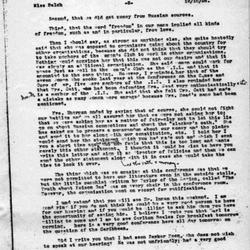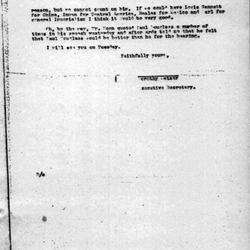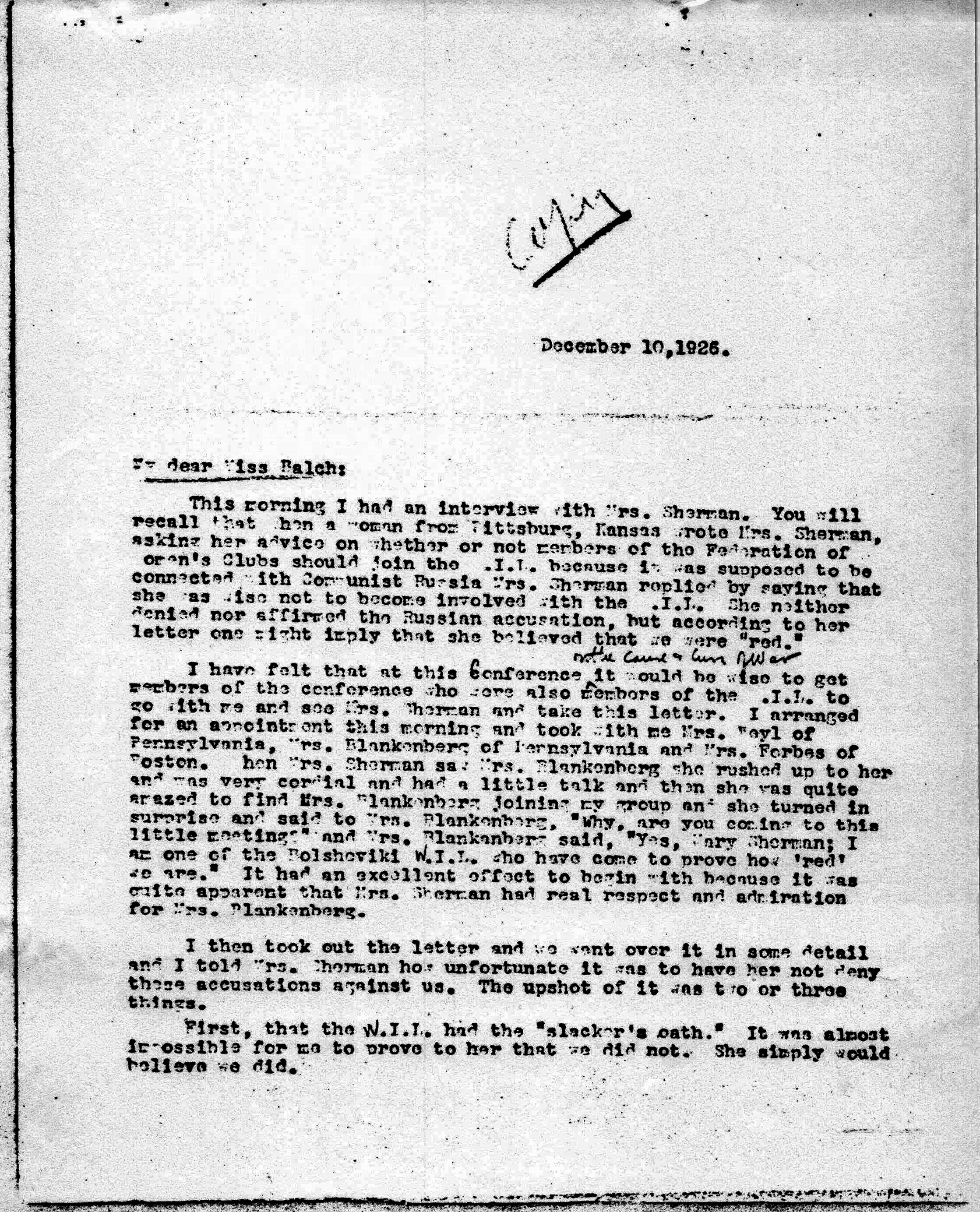Copy
December 10, 1926.
My dear Miss Balch:
This morning I had an interview with Mrs. Sherman. You will recall that when a woman from Pittsburg, Kansas wrote Mrs. Sherman, asking her advice on whether or not members of the Federation of Women's Clubs should join the [W.I.L.] because it was supposed to be connected with Communist Russia Mrs. Sherman replied by saying that she was wise not to become involved with the [W.I.L.] She neither denied nor affirmed the Russian accusation, but according to her letter one might imply that she believed we were "red."
I have felt that at this Conference ↑on the Cause & Cure of War↓ it would be wise to get members of the conference who were also members of the [W.I.L.] to go with me and see Mrs. Sherman and take this letter. I arranged for an appointment this morning and took with me Mrs. Weyl of Pennsylvania, Mrs. [Blankenburg] of Pennsylvania and Mrs. Forbes of Boston. When Mrs. Sherman saw Mrs. [Blankenburg] she rushed up to her and was very cordial and had a little talk and then she was quite surprised and said to Mrs. [Blankenburg], "Why, are you coming to this little meeting?" and Mrs. [Blankenburg] said, "Yes, Mary Sherman; I am one of the Bolsheviki W.I.L. who have come to prove how 'red' we are." It had an excellent effect to begin with because it was quite apparent that Mrs. Sherman had real respect and admiration for Mrs. [Blankenburg].
I then took out the letter and we went over it in some detail and I told Mrs. Sherman how unfortunate it was to have her not deny these accusations against us. The upshot of it was two or three things.
First, that the W.I.L. had the "slacker's oath." It was almost impossible for me to prove to her that we did not. She simply would believe we did. [page 2]
Second, that we did get money from Russian sources.
Third, that the word "freedom" in our name implied all kinds of freedom, such as and in particular, free love.
Then I should say, as strong as anything else, she quite heatedly said that she was opposed to organizers going about the country for other organizations, because she did not think that they should try to take members of the Women's Club to work in other organizations. Nothing would convince her that this was not our desire and that it was simply an additional organization. She said women could work for peace just as well in the Women's Club as the W.I.L. and that it amounted to the same thing. However, I reminded her that of the seven women who spoke last year at the Conference on the Cause and Cure of War, five were members of the [W.I.L.] I also reminded her that Mrs. Catt, who had been defending Mrs. Mead very enthusiastically ↑& that Mrs. M↓ is a member of the [W.I.L.] She said that she felt Mrs. Catt had made a mistake as many women were enraged because Mrs. Mead's name had been mentioned.
Mrs. Sherman ended by saying that of course, she could not fight our battles and we all assured her that we were not asking her to; that we were asking her as a matter of fair-play not to let this lie go on about Russian connections and about the "slacker's oath." She has asked me to prepare a memorandum about our money and the pledge and send it to her along with our constitution, etc. I told her I would send her the statement which you had made out and which I sent you a short time ago ↑[from?] [illegible]↓, but she feels that this is too long and wants merely this other statement ↑on the oath & money.↓ I thought it would be wise to have you write this letter and sign it as Director of Policies and [then] we can send the other statement along with it in case she would take the time to look it over.
The thing which was so amazing at this conference was that we were not permitted to have our literature even in the outside stalls, but the little pamphlet written by Taylor of the Legion, called "The Truth about Poison Gas" was on every chair in the conference room. However, the organization went on record for ratification.
I understand that you will see Mr. Inman this weekend. I am [wondering] if you do not think he would be a very good person to have for our hearing and if you would be willing to ask him when you have the opportunity of seeing him. I believe I wrote you that [Earle] is willing to come and I am to see [Carleton Beals] for breakfast tomorrow morning. [There] is a very good conference here all day tomorrow on the question of the Caribbean.
Did I write you that I had seen Parker Moon, who does not wish to speak at our hearing? He was not unfriendly; had a very good [page 3] reason, but we cannot count on him. If we could have Lewis Gannett for China, Inman for Central America, [Beals] for Mexico and [Earle] for general Imperialism I think it would be very good.
Oh, by the way, Mr. Moon quoted Paul [Douglas] a number of times in his speech yesterday and afterwards told me that he felt that Paul [Douglas] would be better than he for the hearing.
I will see you on Tuesday.
Faithfully yours,


























Comments